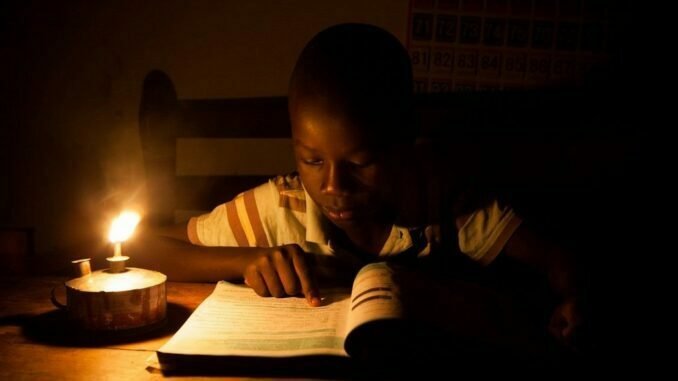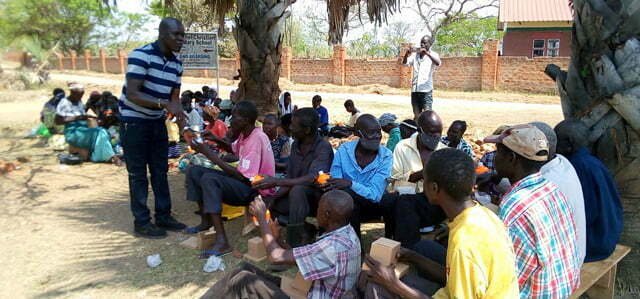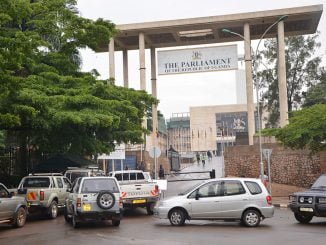
Gulu, Uganda |URN| Every week, 68-year-old Mary Oketta, from Kati Kati Village in the East of Gulu City, spends a minimum of 2,000 Shillings to fuel her kerosene lamps, the main source of light for her household.
Oketta is among the more than 60 per cent of the population in Oitino Parish, Gulu East, who do not have access to electricity. But for the past seven years, she has suffered from conditions that doctors believe were partly caused by inhaling fumes from kerosene lamps.
Epidemiologic studies have linked household kerosene lamp use to impaired lung function, asthma, cancer, dermatitis and increased susceptibility to infectious diseases such as tuberculosis.
Doctors have now advised Oketta against using a kerosene lamp, firewood for cooking, entering a house filled with smoke, a house that is being swept, or stepping outside when it is windy.
According to Oketta, each time she is admitted to the hospital, she receives up to five units of blood to her system before her health improves, adding that she has lost count of how much she has spent managing her illness.
“Doctors advised me not to use firewood for cooking, staying in a house filled with smoke, or that is being swept, and even staying outside when it is windy. I Have been vomiting blood for seven years. And when this happens, doctors have to add 5 units of blood before my health improves.
So, in terms of money, I have spent a lot that I can’t sum up. Even now as I talk with you, I might get a vomiting fit, because I was told that a vein has burst and it needs to be operated on. Doctors in Lacor referred me to Mulago hospital for it to be worked on, but I can’t afford the cost,” she said.
“Vicky Adochm another area resident narrates how her 78-year-old mother is now treating the effects of inhaling polluted air. According to Adoch, her ageing mother was diagnosed with lung damage and advised against sing kerosene lamps and staying in a smoky house.
She says that the initial amount she spent on treating her mother was 280,000 Shillings and has now resorted to buying tablets from drug shops, because she can’t afford to take her for regular hospital reviews.
Kerosene lamps are still widely used for lighting in Gulu, especially in areas that are not connected to the national power supply grid. However, many users say that they know that kerosene lamps are dangerous, especially for those who live in grass-thatched houses, inefficient, and costly.
A report on the top ten causes of morbidity and mortality from Gulu district health department shows that respiratory infections were the second leading cause of morbidity and mortality among people of all ages both in Gulu City and Gulu district the past six months.
According to the statistics, there was a total of 29,367 respiratory infections recorded in Gulu city in the last six months, translating to 12.4 per cent of all causes of morbidity. Out of these, 17.3 per cent were children aged under the age of five. The records also show that 15 of children of children aged 5 and older, died of respiratory infections in the past six months.
While in Gulu district, 13.5 per cent of patients across ages were infected with respiratory tract diseases. 16.7 per cent of children died of the disease, and 12.8 per cent of those five years and older also died of the infections, all in the past six months.
Willian Onyai the Gulu district health educator says that although using kerosene lamps does not cause respiratory infections in isolation, it remains one of the biggest contributing factors.
Onyai says the respiratory infections are common because their mode of transmission is airborne, and is worsened by the fact that many people in the district live in overcrowded places, poorly ventilated houses, coupled with dust and harsh weather.
Upon this state of affairs, the MP-elect for Gulu East, Martin Ojara Mapenduzi, has launched a program to distribute solar light to the elderly and persons with disability in his constituency.
Read Also: Renewable energy dealers in Uganda ask gov’t to curb down counterfeit products
Through his Mapenduzi Foundation, which was set up two years ago, Mapenduzi has distributed solar lights to 1,000 households in Gulu East, as one of the ways to eradicating the use of kerosene lamp for lighting.

Mapenduzi says he targeted the elderly because they are out of active productive work and cannot afford to buy kerosene to light their lamps regularly, and also because their immune system is low, which makes them more susceptible to the infections.
According to Mapenduzi, 60 per cent of the population in Gulu East still use kerosene lamps for lighting, 10 per cent use electricity, while the rest use either solar or candle for lighting.
Mapenduzi revealed that the program will also benefit the young, but they will have to buy the solar light so that the use of kerosene lamps is completely stopped.



